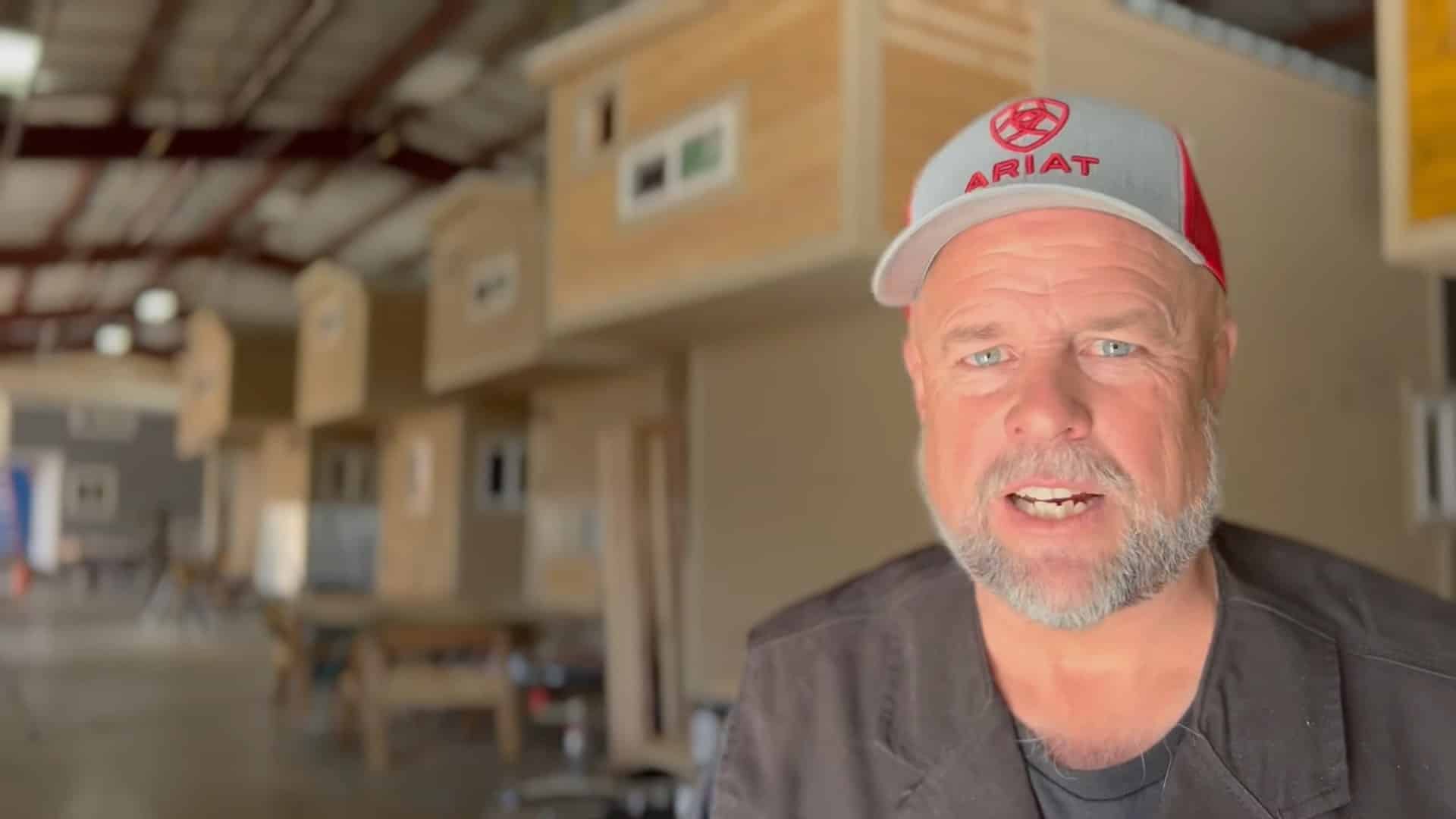
Matthew Sowash, CEO of Holy Ground Tiny Homes in Englewood, speaks in a promotional video for the nonprofit company. (YouTube)
An eight-month investigation into a tiny homebuilder in Englewood that took $6 million from customers who never received houses has uncovered an array of strange purchases.
Holy Ground Tiny Homes, a bankrupt nonprofit, was investigated by the U.S. Trustee Program, an office within the Department of Justice, from the start of this year until Sept. 1.
The resulting 81-page report, filed with the U.S. Bankruptcy Court in Denver late Friday night, shows that between October 2020 and August 2022, Holy Ground spent at least $241,000 on racecars and other vehicles unrelated to its business, $165,000 on repairs for those vehicles, $35,000 on land purchases in Colorado and Alaska, and $32,000 on meals.
During the first six months of 2022 — a time when the nonprofit company was hemorrhaging money and customers who had given their life savings for a home were being denied refunds — Holy Ground spent $55,000 on an “extraordinary” amount of travel, including limousine rides and multiple trips to Las Vegas. At least one trip involved a $660-per-night hotel.
Holy Ground, which was allowed to read and comment on the federal report before it was filed last week, said that its “travel to Las Vegas was part of an employee appreciation benefit. The travel expenses were for multiple trips for key employees and subcontractors.”
Holy Ground CEO Matt Sowash and Holy Ground attorney Aaron Conrardy, of Wadsworth Garber Warner Conrardy in Denver, declined opportunities to comment further Tuesday.
Sowash served nearly two years in prison for theft of about $470,000 in the 2000s. That cash was taken from investors in his poker league and failed poker tournament in Las Vegas.
Holy Ground’s unusual purchases, uncovered by Joli Lofstedt, a Denver lawyer tasked by a bankruptcy judge with investigating Holy Ground’s finances, range from major to miniscule.

Joli Lofstedt is a bankruptcy lawyer with the Onsager Fletcher Johnson Palmer law firm in Denver. (LinkedIn)
On the high end are payments on two dozen vehicles — six motorcycles, three racecars, three vehicles from 1959 and a limousine among them. On the low end are $5,234 in spa visits, $1,000 worth of superhero costumes, a $400 engagement ring and $200 for men’s slippers.
As first reported by BusinessDen last summer, Holy Ground took money from hundreds of customers across the country in 2020, 2021 and 2022 with promises to build them cheap, custom tiny homes within months. Some instead waited years to receive houses or refunds. About 190 buyers, who paid Holy Ground a combined $6 million, received nothing.
Arthur Lindquist-Kleissler, a Denver attorney representing a couple who lost $58,130, said Lofstedt’s report suggests “far more than incompetence” by Holy Ground and Sowash. He wishes Lofstedt had gone further to investigate the missing or misspent money, by interviewing people who went to Las Vegas or worked for Holy Ground, for example.
Lofstedt’s investigation was prompted by questions from customers about where their money went. The probe took months longer than expected, to the frustration of judges.
“We will all be waiting with bated breath to see the report,” U.S. Bankruptcy Judge Elizabeth Brown told Lofstedt on June 1, “because we need to find out what happened.”
“There are a lot of questions about whether the debtor’s management can continue,” Brown said at that hearing, “and whether this business can survive its reputational loss.”
Lofstedt’s report raises further doubts about Holy Ground’s chances of survival. In 2021, the nonprofit spent $4.4 million on materials to build homes that it sold for $2.6 million, according to the report. In 2022, it spent $5.3 million to build homes that it sold for $2 million.
“Based on these amounts, in order to break even before operating expenses, (Holy Ground) would need to almost double the sales price of the tiny homes,” Lofstedt wrote.
Brown retired this summer and the Holy Ground case was transferred to Judge Thomas McNamara. At a hearing July 20, he questioned how Holy Ground can successfully reorganize when it “has lost money since the (Chapter 11) bankruptcy case started” last October.
“I’m very troubled,” McNamara said then. “I continue to be very troubled about the case.”
“I’m wondering what happened to all of the money,” the judge later added.
Lofstedt told both judges that while Sowash and Holy Ground were aiding in her investigation, she was hindered by their lack of a paper trail. “A number of transactions … are just listed as withdrawals,” without supporting documentation, she told McNamara in July.
“I can’t tell where the money went or whether those were legitimate transactions,” she said.
That includes $86,487 in withdrawals that Holy Ground and its partner charity, Revelations in Christ Ministries, claim were spent on philanthropic work, according to Lofstedt’s report.
It also includes $586,000 in cash withdrawals that were allegedly used to pay subcontractors to build tiny homes. Lofstedt found “no supporting documentation” for those cash payments.
“Payment in cash without tracking or documenting the basis for the transaction is clearly mismanagement and an opportunity for fraud,” said Lindquist-Kleissler, the lawyer.
“The IRS issues, the labor issues, raise multiple red flags.”
